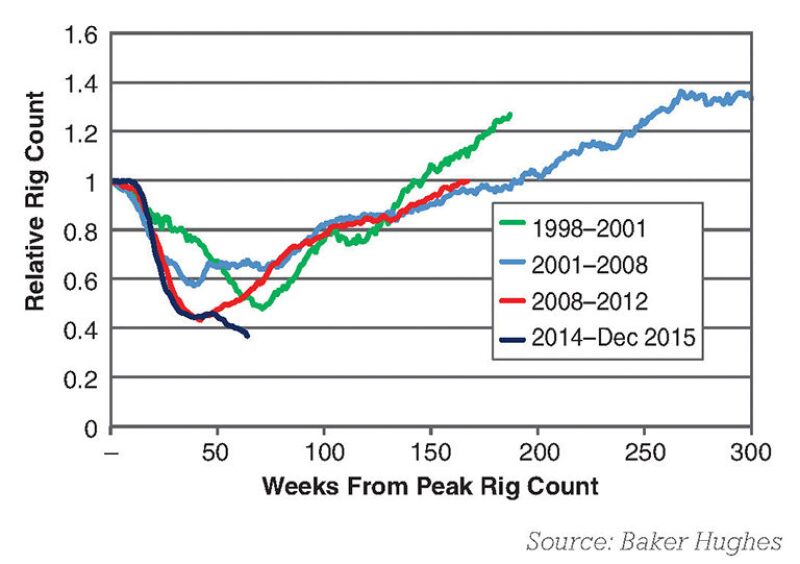
The English punk rock band, The Clash, posed this question musically in 1982. It is unlikely they intended it as a starting point for a discussion on careers in petroleum engineering. Yet, this was the topic of a SPE young professionals (YPs) meeting at the Asia Pacific Oil and Gas Conference and Exhibition I attended where, like everywhere else, YPs were concerned about the downturn in oil and gas prices and the resulting impact on their career choices.
Interestingly, the title of the session was “Ridin the Storm Out,” another 1980s hit by REO Speedwagon. This title implies a temporary drop in the industry, perhaps like the 2008 Asian financial crisis. In that “storm,” oil prices dropped from more than USD 140/bbl to less than USD 40/bbl; North American rig count dropped from more than 2,000 to fewer than 900.
Mapping rig activity over industry downturns since 1998 shows that the three prior storms were all relatively brief. In each of these downturns, rig activity in the US reached 80% of its prior peak activity within 2 years of the fall. Until late August last year, the current downturn had more or less tracked the previous decline in 2008. Will we recover in 2–3 years as in prior downturns, or will this be like the 1980s? What does that portend for young engineers in our industry? I do not have a magic ball, but I can share some statistics and thoughts.

During the 1980s, rig count dropped from a peak of 4,469 active rigs in November 1981 to 686 rigs in June 1986. The US rig count stayed below 1,300 from 1 March 1986 to 1 February 2005, reaching a low point of 502 rigs in February 1999. This marked the lowest rig count since Baker Hughes began reporting rig counts in the 1940s. This was not a storm. It was an ice age.
Here are a few questions you are probably pondering. Will there be jobs available? What will it be like to work in an environment of constant focus on costs and efficiency? Is this the industry in which I want to spend my career? Wherever I go, students and professionals share this concern.
Experiencing the First Downturn
A YP today is typically seeing his or her first protracted downturn, and no one knows how long it will last. I can share with you some observations about that last protracted downturn: It was the best time to be a petroleum engineer in my 40-year career. During that time of low prices, our industry developed and commercialized modern horizontal wells, multilateral wells, slickwater hydraulic fracturing, measurement-while-drilling and logging-while-drilling techniques, and multistage hydraulic fracturing of horizontal wells. Most of the technologies used to subsequently develop ultradeepwater reservoirs were envisioned, advanced, or tested during that period.
The steam-assisted gravity drainage technique had been conceptualized earlier but was proven during the downturn. Geostatistics and geomechanics emerged from being highly specialized sciences to routine components of how we approach problems. Computational advances revolutionized the way we solved problems. I received several promotions.
I had the opportunity to become an SPE Distinguished Lecturer and see the world. I had the honor of serving on the SPE Board of Directors.
There are advantages to these stormy times. Instead of “chasing rigs” due to high activity levels, we have to innovate. We have to find new ways of solving problems, and we will do so. Our industry will succeed at any product price.
Most of you will keep your jobs; however, your jobs will change. As the most senior professionals reach retirement age during the next 5–10 years, you will have opportunities for increased levels of responsibility that no previous generation of engineers and earth science professionals have ever enjoyed.
Many people lost their jobs during the previous protracted downturn, just as they have thus far during this one. On the other hand, there are many, many more employers today than in 1988. The types of jobs and opportunities available internationally are radically different from those in the late 1980s. Some of you will go back to school.
Going Back to School: Is It for You?
During the 1980s downturn, I had the unenviable task of either selecting or confirming which engineers would be let go. It was no fun. After some serious soul searching, I decided to go to Stanford University to earn my PhD. At the time, I worked for my mentor and 1972 SPE president, the late M. Scott Kraemer.
With four children and no guarantee of support from my company, I was anxious about the decision. Scott advised me, “Take your time answering this question. When you are 40 years old, will you regret not having a PhD? If so, you go get it, no matter the cost, because you don’t need to have such regrets.” I decided to go for it, and fortunately for me, my company provided me “just enough” support. This single decision was the best professional decision of my career. It opened opportunities that I would never have had otherwise.
It is silly to try to “run the economics” on going back to school. Your knowledge about what will happen in the future is too limited. Perhaps you are considering a master’s degree in petroleum engineering. This is an awesome idea. Getting it as an online degree is an option, but a full-time degree will have more value. Consider a school other than where you received your bachelor’s degree. Consider looking abroad. For Americans, I often recommend Imperial College, Heriot-Watt, Delft, KAUST, or any of the English-language master’s programs around the world. If you are going to broaden your horizons, why not open them to the world? Students educated abroad do not hesitate to consider coming to the US. Would you be more or less attractive to an oil company with that master’s degree? Do you think that an engineer with a master’s degree will be more valuable in a decade? Will you regret not having that degree when you are 40?
I often get asked about pursuing an MBA. Engineers truly need to understand how their companies make money and NPV [net present value] and EMV [expected monetary value] concepts. An MBA may provide deeper insights into finance, but most engineers do not need one to understand cash flow and economics issues. Getting an MBA may provide good opportunities and alternate career paths.
I always recommend that if an engineer is going to make that commitment, he or she go (full time) to the best school possible. Decades of international travel have convinced me that advanced degrees from the best-known schools maintain “value” in many cultures beyond what one would expect in the US, and that a Stanford or Harvard MBA maintains its glitter long after the courses are forgotten. If you cannot get into one of the top schools, then graduate in the top 10% and make friends with the movers and shakers. They will be your colleagues and competitors for decades to come.
Stay Current With SPE
Not interested in retooling? Not everyone is, due to family commitments, financial situation, or other personal interests. If you decide not to return to school, be sure to stay current. SPE is the center of the state-of-the-art in technology, and companies need people to implement this technology economically. Volunteering at SPE gives you exposure and opportunities you cannot get otherwise.
If you are technically inclined, try reviewing papers. It is essential to keep the peer-review process working. Try reading one full-length SPE paper each week, and summarize the key points. When you go to SPE meetings with exhibitions, make sure you understand what each of the exhibitors really does. As a young engineer at my first Offshore Technology Conference, I had to ask dozens of exhibitors what they actually did. There are still exhibitors I ask to explain what they do.
Some SPE sections run workshops on interviewing, résumé skills, “how to be a consultant,” and even “how to start your own oil company.” If yours has not done so, why not propose it?
How about organizing a “How to make a professional-looking LinkedIn page” workshop through your section, either for all section members or maybe just for the YPs?
At one point in my career, I tried to buy oil and gas properties for a while and failed miserably. Other investors I met asked for help, and pretty soon I was a consultant. Fortunately, my SPE connections allowed me to always have opportunities to consult.
Maybe you can consider taking a break from the industry with a planned return. I was fortunate to be able to go with my wife to Asia for 18 months to coordinate our church’s humanitarian efforts. While there, I could see problems through the eyes of a petroleum engineer and see how much of a difference safe, affordable energy makes. It was the most meaningful period of my life. Perhaps a similar “time-out” makes sense for some of you. While living in Asia, I remained an active member of my local SPE section and attended a conference and a forum. You should always stay active in your local or technical chapter.
Keep in mind why you joined this industry. We provide safe, affordable energy, improving the quality of life for the inhabitants of our planet. This is where your ideas can be translated into multimillion-dollar investments much earlier in your career than in most other industries. It is where you can have field experiences or travel around the world. It is a place where the greatest people in the world work.
We do not know whether we are in the midst of a storm or at the beginning of another ice age. And, we do not know whether you should stay or you should go, although we hope you stay. What we do know is that SPE is here for you and will be throughout your career. We know that what you do is important. And, we know that what you do improves people’s lives.


